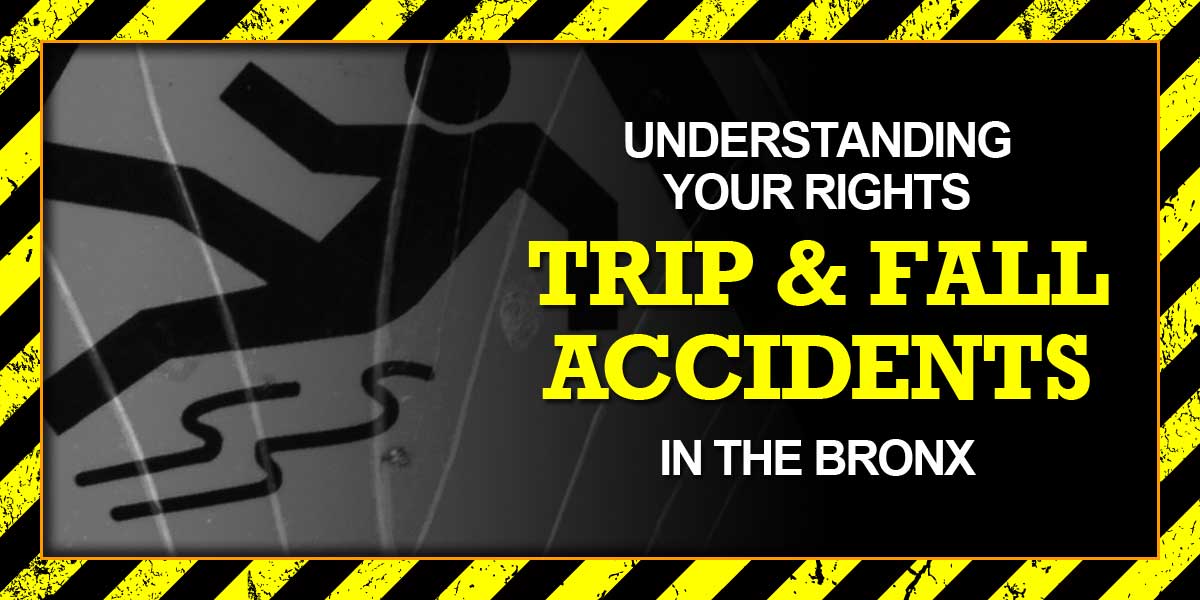Trip and fall accidents are unfortunately common and can happen anywhere—from private premises to city property and even NYC transit property. Knowing your rights and the steps to take after such an accident can make a significant difference in how you handle the situation. This primer will guide you through what you need to know if you are a potential victim of a trip and fall accident in the Bronx.
1. Types of Trip and Fall Accidents
Private Premises: These accidents occur on private property such as homes, businesses, or rental properties. Common causes include uneven floors, loose carpets, poor lighting, and cluttered walkways.
City Property: These accidents happen on public property, including sidewalks, parks, and streets. Causes can range from broken or uneven sidewalks to potholes and poorly maintained public spaces.
NYC Transit Property: This includes accidents in subways, buses, and train stations. Common hazards include slippery platforms, broken stairs, and poorly maintained pathways.
2. Steps to Take After a Trip and Fall Accident
Seek Medical Attention: Your health is the top priority. Even if injuries seem minor, it’s essential to get checked by a healthcare professional as some injuries may not be immediately apparent.
Report the Accident:
- Private Premises: Inform the property owner or manager immediately. Make sure to get their contact information and document the report.
- City Property: Report the incident to the New York City Department of Transportation (DOT). You can also contact 311 to file a complaint.
- NYC Transit Property: Report the accident to a station agent or transit employee and ensure it’s officially documented.
Document the Scene: Take photographs of the area where the accident occurred, capturing any hazards that contributed to your fall. Note the date, time, and specific location.
Gather Witness Information: If anyone witnessed the accident, get their contact details. Their statements can be crucial if you decide to pursue a claim.
Keep Records: Maintain a file with all medical reports, receipts, accident reports, and any correspondence related to the accident.
3. Understanding Liability
Private Premises: Property owners have a duty to maintain a safe environment. If they fail to do so, they can be held liable for any injuries that occur. This includes homeowners, business owners, and landlords.
City Property: The City of New York can be held liable if it’s proven that they were negligent in maintaining safe public spaces. However, there are strict guidelines and timeframes for filing a claim against the city.
NYC Transit Property: The Metropolitan Transportation Authority (MTA) can be held responsible for accidents that occur on their property if negligence is proven.
4. Filing a Claim
Notice of Claim: If you’re filing against a city entity (like the DOT or MTA), you must file a Notice of Claim within 90 days of the accident. This is a critical step that cannot be skipped.
Consult an Attorney: Trip and fall cases can be complex, especially when dealing with city entities. An experienced personal injury attorney can help you navigate the legal process, gather necessary evidence, and advocate on your behalf.
Statute of Limitations: In New York, you generally have three years from the date of the accident to file a lawsuit for a trip and fall injury. However, cases against the city have shorter deadlines, so acting promptly is essential.
5. Prevention Tips
While accidents can happen, there are steps you can take to reduce the risk:
- Stay Alert: Pay attention to your surroundings, especially in unfamiliar areas.
- Wear Appropriate Footwear: Choose shoes with good traction, particularly in bad weather.
- Report Hazards: If you notice unsafe conditions, report them to the property owner, city authorities, or transit officials.
Trip and fall accidents can be life-altering, but understanding your rights and the proper steps to take can help you secure the compensation you deserve. If you or a loved one has been injured in a trip and fall accident in the Bronx, don’t hesitate to seek legal advice to protect your interests and ensure a fair outcome.
